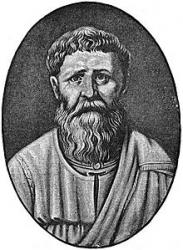Planning worship?
Check out our sister site, ZeteoSearch.org,
for 20+ additional resources related to your search.
- |
User Links
Person Results
Samuel Sebastian Wesley

1810 - 1876 Person Name: S. S. Wesley (1810-1876) Composer of "AURELIA" in Hymns for Today's Church (2nd ed.) Samuel Sebastian Wesley (b. London, England, 1810; d. Gloucester, England, 1876) was an English organist and composer. The grandson of Charles Wesley, he was born in London, and sang in the choir of the Chapel Royal as a boy. He learned composition and organ from his father, Samuel, completed a doctorate in music at Oxford, and composed for piano, organ, and choir. He was organist at Hereford Cathedral (1832-1835), Exeter Cathedral (1835-1842), Leeds Parish Church (1842-1849), Winchester Cathedral (1849-1865), and Gloucester Cathedral (1865-1876). Wesley strove to improve the standards of church music and the status of church musicians; his observations and plans for reform were published as A Few Words on Cathedral Music and the Music System of the Church (1849). He was the musical editor of Charles Kemble's A Selection of Psalms and Hymns (1864) and of the Wellburn Appendix of Original Hymns and Tunes (1875) but is best known as the compiler of The European Psalmist (1872), in which some 130 of the 733 hymn tunes were written by him.
Bert Polman
Samuel Sebastian Wesley
Timothy Dudley-Smith
b. 1926 Person Name: Timothy Dudley-Smith (born 1926) Adapter of "Light of the minds that know him" in Hymns for Today's Church (2nd ed.) Timothy Dudley-Smith (b. 1926) Educated at Pembroke College and Ridley Hall, Cambridge, Dudley-Smith has served the Church of England since his ordination in 1950. He has occupied a number of church positions, including parish priest in the diocese of Southwark (1953-1962), archdeacon of Norwich (1973-1981), and bishop of Thetford, Norfolk, from 1981 until his retirement in 1992. He also edited a Christian magazine, Crusade, which was founded after Billy Graham's 1955 London crusade. Dudley-Smith began writing comic verse while a student at Cambridge; he did not begin to write hymns until the 1960s. Many of his several hundred hymn texts have been collected in Lift Every Heart: Collected Hymns 1961-1983 (1984), Songs of Deliverance: Thirty-six New Hymns (1988), and A Voice of Singing (1993). The writer of Christian Literature and the Church (1963), Someone Who Beckons (1978), and Praying with the English Hymn Writers (1989), Dudley-Smith has also served on various editorial committees, including the committee that published Psalm Praise (1973).
Bert Polman
Timothy Dudley-Smith
Saint Augustine

354 - 430 Person Name: Augustine (354-430) Author of "Light of the minds that know him" in Hymns for Today's Church (2nd ed.) St. Augustine, born in Africa; wrote six books on music, which were printed at Lyons, 1586, eleven hundred forty six years after his death, which took place A.D. 440.
A Dictionary of Musical Information by John W. Moore, Boston: Oliver, Ditson & Company, 1876
Saint Augustine
Ralph Vaughan Williams

1872 - 1958 Person Name: R. Vaughan Williams (1872-1958) Arranger of "KING'S LYNN" in Hymns for Today's Church (2nd ed.) Through his composing, conducting, collecting, editing, and teaching, Ralph Vaughan Williams (b. Down Ampney, Gloucestershire, England, October 12, 1872; d. Westminster, London, England, August 26, 1958) became the chief figure in the realm of English music and church music in the first half of the twentieth century. His education included instruction at the Royal College of Music in London and Trinity College, Cambridge, as well as additional studies in Berlin and Paris. During World War I he served in the army medical corps in France. Vaughan Williams taught music at the Royal College of Music (1920-1940), conducted the Bach Choir in London (1920-1927), and directed the Leith Hill Music Festival in Dorking (1905-1953). A major influence in his life was the English folk song. A knowledgeable collector of folk songs, he was also a member of the Folksong Society and a supporter of the English Folk Dance Society. Vaughan Williams wrote various articles and books, including National Music (1935), and composed numerous arrangements of folk songs; many of his compositions show the impact of folk rhythms and melodic modes. His original compositions cover nearly all musical genres, from orchestral symphonies and concertos to choral works, from songs to operas, and from chamber music to music for films. Vaughan Williams's church music includes anthems; choral-orchestral works, such as Magnificat (1932), Dona Nobis Pacem (1936), and Hodie (1953); and hymn tune settings for organ. But most important to the history of hymnody, he was music editor of the most influential British hymnal at the beginning of the twentieth century, The English Hymnal (1906), and coeditor (with Martin Shaw) of Songs of Praise (1925, 1931) and the Oxford Book of Carols (1928).
Bert Polman
Ralph Vaughan Williams
William Lloyd
1786 - 1852 Person Name: W. Lloyd, 1785-1852 Composer of "MEIRIONYDD" in The Book of Praise William Lloyd, a Welsh musician and music teacher, born at Rhos-goch , Llaniestyn , Llŷn , in 1786; died, according to his tombstone in Llaniestyn churchyard, on 7 June 1852 , aged 66. He is most known for his tune MEIRIONYDD. It was published under the name "BERTH" in Caniadaeth Seion ( 1840 ) published by Richard Mills.
Dianne Shapiro, from Dictionary of Welsh Biography, accessed 11-8-2018 from http://wbo.llgc.org.uk
William Lloyd
Charles Herbert Kitson
1874 - 1944 Person Name: C. H. Kitson Arranger of "MOVILLE" in Evangelical Lutheran Hymnary
Charles Herbert Kitson


 My Starred Hymns
My Starred Hymns


